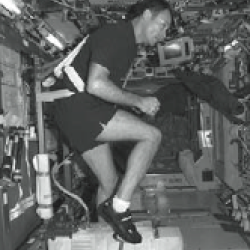Source Institutions
Source Institutions
Add to list Go to activity
Activity link broken? See if it's at the internet archive

In this activity about the circulatory system and space travel (on page 38 of the PDF), learners use water balloons to simulate the effects of gravity and microgravity on fluid distribution in the body. This lesson guide includes background information, setup and management tips, and discussion questions.
- Under 5 minutes
- 45 to 60 minutes
- $1 - $5 per group of students
- Ages 8 - 14
- Activity, Experiment/Lab Activity, Lesson/Lesson Plan, Simulation
- English
Quick Guide
Materials List (per group of students)
- Highlighters
- Oblong-shaped balloon
- Paper towels
- Tub half-filled with water (large enough to float a filled balloon)
- Group concept map (ongoing)
- Copy of student sheet (p. 41)
Subjects
-
Earth and Space Science
- Astronomy
- Earth Structure
-
Engineering and Technology
-
Engineering
- Aerospace Engineering
-
Engineering
-
Life Sciences
-
Human Body
- Circulation
- Health and Nutrition
-
Human Body
-
Mathematics
-
Data Analysis and Probability
- Data Analysis
- Data Collection
- Data Representation
-
Data Analysis and Probability
-
Physical Sciences
-
Motion and Forces
- Gravity
-
Structure and Properties of Matter
- Volume and Density
-
Motion and Forces
-
The Nature of Science
-
The Scientific Process
- Conducting Investigations
- Gathering Data
- Formulating Explanations
- Communicating Results
-
The Scientific Process
Audience
To use this activity, learners need to:
- see
- read
- touch
Learning styles supported:
- Involves teamwork and communication skills
- Involves hands-on or lab activities
Other
Includes alignment to state and/or national standards:
Includes assesments for student learning:
This resource is part of:
Access Rights:
- Free access
By:
- Tharp, Barbara Z. ; Erdmann, Deanne B. ; Matyas, Marsha L. ; McNeel, Ronald L. ; Moreno, Nancy P.
Rights:
- All rights reserved, Baylor College of Medicine, 2009
Funding Source:
- NASA, NCC 9-58
